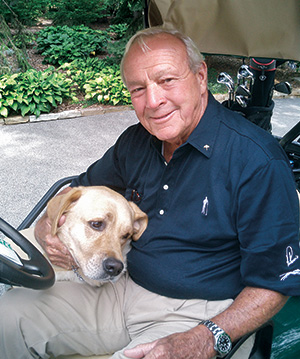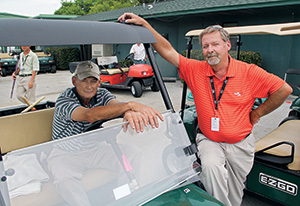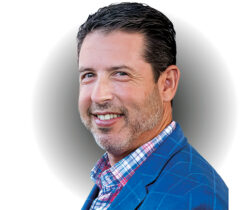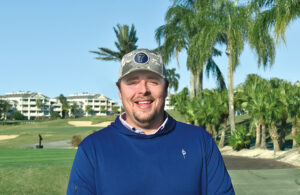The Golfdom Conversation: Arnold Palmer and Matt Beaver
Sure, it’s called the Arnold Palmer Invitational. But we never thought that Mr. Palmer would actually invite us.
If the King invites you to his tournament, you go. And we did.
Over the course of the tournament we got a lot accomplished. (For a complete rundown of the action, go here.) We talked to Tour players, we talked to superintendent Matt Beaver, we got a lot of great photos and we even saw a few old friends.
But the singular most exciting moment was getting to meet Palmer in person. In a strange bit of coincidence, that meeting between Golfdom and Mr. Palmer somehow got a brief mention in an Associated Press story that ran around the country.
While we had the ears of Mr. Palmer and Mr. Beaver, we asked a few questions of both men. Here are our conversations…
Golfdom: Mr. Palmer, thanks so much for your time, it’s truly an honor.
Arnold Palmer: My pleasure, thank you.
G: My first question is in regards to the founder of this magazine, Mr. Herb Graffis. I have the good fortune of sitting in his chair today, but I never had the opportunity to meet the man. Can you tell me a little about him?
AP: Herb was a good friend. We spent a lot of time together, mostly just kibitzing and talking about golf and what (Golfdom) does and the things that were important for people to read about in the game of golf… and how superintendents react to the various situations that arise in the process of being a superintendent.
G: I hear he was quite a character…?
AP: Oh, he was a character — he always had a good joke!
G: I was speaking with an architect recently and he told me that ‘golf isn’t as down as the media is trying to lead everyone to believe.’ What’s your take on that statement?
AP: I’ve been reading a little bit about the economy and what is happening to golf. The only place I’ve seen an appreciable downturn is the construction of new golf courses. (New course constructions) are starting to rev up a little. I think we’ll be building some courses, and redoing some courses. (And) rounds played are increasing and will increase in 2013.
G: Good, good. I think we’re both in the right business.
AP: Ha! Good. Me too.
G: Can you tell me how things are going for your design company right now?
AP: Mostly right now, (we’re doing) repairs or upgrading courses. We have some potentials in Mexico, South America, China and a couple of very likely prospects in the United States. The business is not that bad.
G: You have a long history with superintendents, since your father was one…
AP: My father was a golf course greenkeeper, a superintendent. He started digging ditches when they were building the course (Latrobe CC, Latrobe, Pa.) So he learned the job from the bottom up, and he was there all his life. That was over 50 years of work on the course. And he did everything from changing cups to cutting fairways to waxing skis so people could ski on the golf course — things that probably people don’t hear about much today.
G: How do you think that job has changed over the years?
AP: Well, I suppose it’s more of a supervision job now. Some supers get out in the dirt, and do the job physically, a lot are more signal callers, I suppose you could say — they direct and supervise more than they do the work itself. There’s a combination of types. Some like to drive the mowers, some use the shovels, and then others would rather be supervisors and study the new techniques for greenkeeping.
G: What do you look for when you’re hiring a superintendent?
AP: Details. A lot of what I look for in a super is if he’s paying attention to the details of maintaining a golf course. That is very important to me and something I watch constantly. Simple little things like where they turn the mowers, and how they turn the mowers, whether it be a greens mower or a fringe or a tractor-trailer mower, whatever. How careful they are — there’s a lot of damage that can be done just by maintaining a golf course.
G: Is there any equipment or new products in the maintenance shop that have caught your eye lately?
AP: It’s amazing to watch golf course maintenance equipment evolve over the years. Our Jacobsen mowers have become so flexible that even one machine can be used on many different parts of the golf course. This helps our superintendent, Matt Beaver, and his crew to get more done in less time. Overall, I think Jacobsen is doing very well with the various types of new equipment that they’re integrating into our industry.
G: What can you tell me about Matt Beaver, the superintendent at Bay Hill Lodge & Club?
AP: He has been here about 10 years and is doing an excellent job. He’s a great young man and someone I’m particularly interested in… helping him and keeping him doing the things that he’s doing so well now. And he will continue to do well. I think — well, I know — the course is about as good as it’s ever been.
G: Those are my questions, thanks so much for your time Mr. Palmer, and especially for the kind words about Mr. Graffis.
AP: Of course, my pleasure.
Matt Beaver, superintendent at Bay Hill Club & Lodge, started out as an intern at the course 12 seasons ago. After graduating from Iowa State University he moved to Orlando to work on the crew. After working his way up, he became the head superintendent when the position opened up three years ago.
Golfdom: Matt, we’ve talked to a few of the Tour players, and they’re raving about the course. Brandt Snedeker said, “It’s as primo as I’ve ever seen it,” and Charley Hoffman called it “the best I’ve ever seen it.” What do you attribute this success to?
Matt Beaver: The weather’s been helpful. Any time you get the weather in your favor, it sure helps. And I think that since 2009, when we did the renovation, when you do a renovation you always have a few issues here and there, and as you tie those up, you learn a few things, you get better and better.
G: You’ve had several international guys helping out this week, how did that come about?
MB: Yes, we’ve got Stuart from Ireland, and two kids that came down just for the tournament as part of the Ohio State program; Ping from China and Ty from Vietnam. They’ve been great for us. Those guys work their tails off and they’re really interested in this business. It’d be hard to do it and do a good job without them.
G: Tell us about your assistant superintendents, Craig Shelton and Wayne
Flannagan.
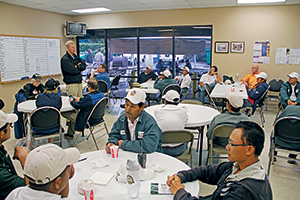
Beaver addresses the crew before they head out for an afternoon shift during the week of the Arnold Palmer Invitational. Photo: Bay Hill
MB: Craig’s been around the business a long time and came back into it, and has been working for us for about eight years. Craig’s a great sounding board for me. For me, it’s good to have someone around like that who you can trust, who you know has your back, and has seen a lot of things. His experience is very important. I like to pick people’s brains, because you don’t know everything.
Wayne started out on the crew, he had never worked out on a golf course before. Wayne’s 62, maybe 63 this year, and that guy just is a hell of a worker. You know you can always count on him. Sometimes, one of the most important things is to have somebody you know will be there for you, no matter what. He’s willing to do whatever you ask him to do and take on new things. And at that age, that’s pretty unique.
G: What kind of equipment are you guys running?
MB: We’ve got the (Jacobsen) 1880s in the fairways, the Eclipse 22-inch and 18-inch running on our greens. They provide us with a lot of flexibility, a lot of good options, so maybe we can reduce the amount of times we have to mow over the greens by changing our frequency of clip. Not only now, during tournament, but during the rest of the year, member events, those kinds of things, it’s been a welcomed addition to what we’re doing — really effective.
G: What’s your favorite thing about tournament week, and the tournament in general?
MB: Mr. Palmer, and seeing it on TV. It’s unique, it’s his golf course, everything is associated with his name… proceeds go to the hospital with his wife’s name on it. (My wife and I have) had two kids. We were fortunate enough to have both kids at the Winnie Palmer Hospital for Women and Babies. It’s a special place, they take care of you.
G: What’s it like working for Mr. Palmer?
MB: It’s just like everybody thinks it is — he’s very good to work for, very honest. If he sees something, he’s going to talk to you about it. But he understands from our aspect, what it’s like to try to do this. As far as a person to work for, I don’t think there could be any better.
G: Got any good Palmer stories to share?
MB: One just happened — following the tournament, he came down to the shop to thank all the crew for their hard work. Everyone got time to say hi and even take a few photos with him. He appreciates that these guys like seeing him and being around him.
G: That’s great, Matt. Thanks to you and your staff this week, and a big thanks for setting time aside for us on what we know is a busy week for you and your team. Nice work!
MB: Thanks Seth, we sure appreciate it.






